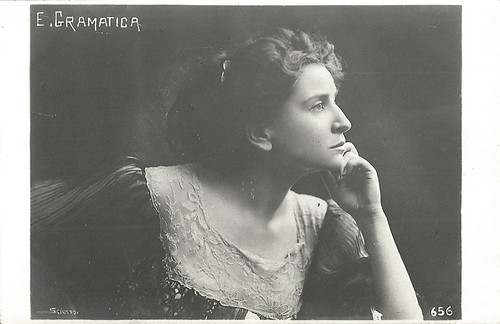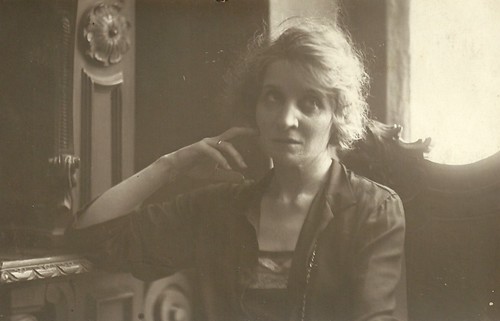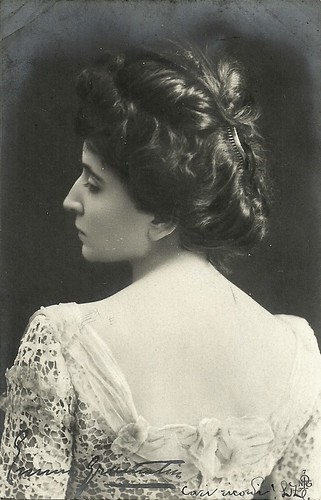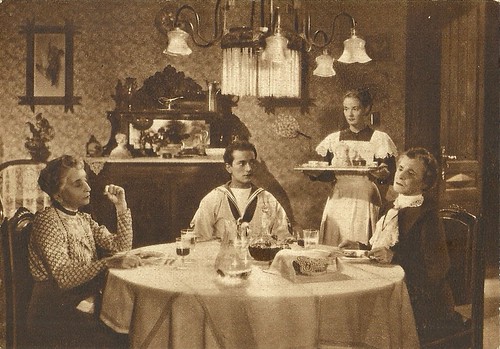
Italian postcard by E. Soc. An. Bettini, Roma, no. 150. Photo: Riccardo Bettini, ca. 1916.

Italian postcard, no. 656. Photo: Sciutto, Genoa.

Italian postcard by Ed. Stab. Capecchi, Livorno, no. 118. Photo: Capecchi, Livorno.

Italian postcard by Leonar, no. 2131. August 1922.

Italian postcard by Ed. A. Vettori, Bologna. Photo: Badodi, Milano.
An elegantly incisive interpretive charge
Emma Gramatica was born Aida Laura Argia Gramatica in Borgo San Donnino, Italy, in 1874. She was the sister of Irma Gramatica and of the lesser-known Anna Adele Alberta Gramatica. Anna was married to Ruggero Capodaglio and sister-in-law of the famous actress Wanda Capodaglio.
She was still a teenager when she made her stage debut next to Eleonora Duse in La Gioconda by Gabriele D'Annunzio. Emma was equipped with a physical appearance that was far from flashy, but with an elegantly incisive interpretive charge, she made her debut in the theatre.
Emma became the 'primattrice' (first actress) at the stage companies of some of the most prestigious names in the Italian theatre of the late 19th and the early 20th century, such as Ermete Zacconi, Flavio Andò, Enrico Reinach and Ermete Novelli.
In the 1910s she formed the famous company Gramatica-Carini-Piperno, in which many great actors acted such as Renzo Ricci and Lola Braccini.
In 1916 Emma debuted on the silver screen as a marriage wrecker in Quando il canto si spegne/When the Hand Goes Out (Emilio Graziani-Walter, 1916), opposite Luigi Serventi. The film was produced by the Milanese company General Film. Although they praised her stage qualities, the press condemned her for her looks and theatricality and didn’t accept her as the mistress for which a man breaks up his marriage. Gramatica understood the message and would stay away from the screen until the arrival of sound cinema in Italy.

Italian/German postcard by NPG (Neue Photographische Gesellschaft). Photo: Sciutto, Genova.

Italian/German postcard by NPG, no. 5.

German postcard by NPG, no. 6. Card dated 11 September 1903. Back is in Italian: ASC Diffida.

Italian/German postcard by NPG, no. 7. Back: ASC Diffida.

Italian postcard by NPG, no. 8.
Acute and pathetic tones
From the early 1930s, Emma Gramatica did prose on radio, first with EIAR and later also with RAI. Gramatica was an actress of the old naturalist school, of acute and pathetic tones.
She started a successful film and television career at a high age, starting with La vecchia signora/The Old Lady (Amleto Palermi, 1931) as an impoverished lady who sells chestnuts on the streets to support her niece.
Gramatica was memorable in Napoli d’altri tempi/Naples of Former Days (Amleto Palermi, 1938) starring Vittorio De Sica, in Mamma (Guido Brignone, 1941) as the mother of Beniamino Gigli, in the melodrama Sissignora/Yes, Madam (Ferdinando Maria Poggioli, 1941) and in the comedy Sorelle Materassi/The Materassi Sisters (Ferdinando Maria Poggioli, 1944), in which she and her sister Irma played two old spinsters.
In her most famous film, Miracolo in Milano/Miracle in Milan (Vittorio De Sica, 1951), she played old Lolotta who finds young Totò (Francesco Golisano) among the cauliflowers in her garden and raises him with an optimist and kind outlook. She also appeared in Don Camillo Monsignore ... ma non troppo/Don Camillo: Monsignor (Carmine Gallone, 1961) starring Fernandel and Gino Cervi.
Emma Gramatica received awards and honours in Italy and the Legion of Honor in France. She died in 1965 in Ostia, near Rome, and rests in the family tomb in the cemetery of Signa, with her sister Irma and their parents.

Italian/German postcard by NPG (Neue Photographische Gesellschaft). Mailed 11 December 1903.

Italian postcard, no. 655. Photo: Sciutto, Genoa.

Italian postcard, no. 664. Photo: Sciutto, Genoa.

Italian postcard by Ed. Stab. Capecchi, Livorno, no. 118. Photo: Capecchi, Livorno.

Italian postcard for Sissignora/Yes Madam (Ferdinando Maria Poggioli, 1941), with Maria Denis, Irma Gramatica, Emma Gramatica, and Leonardo Cortese.
Sources: Wikipedia (Italian and English) and IMDb.
This post was last updated on 5 July 2024.
No comments:
Post a Comment